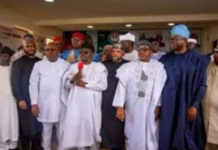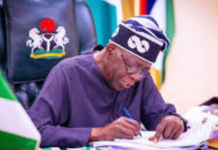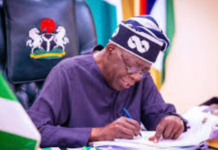Nigeria, Africa’s largest economy, is facing a period of significant economic hardship, impacting households, businesses, and public sentiment nationwide. A combination of inflation, rising food and fuel costs, and high unemployment has created a perfect storm, which has led to increased frustrations among Nigerians and demands for swift government intervention. President Bola Tinubu’s administration has introduced various relief initiatives, but the long-term solutions to Nigeria’s economic issues remain complex and challenging.
Rising Cost of Living and Inflation
One of the primary drivers of public discontent in Nigeria is the rising cost of living. Inflation has spiked in recent months, pushing up prices for basic goods such as food, transportation, and building materials. Many households are struggling to afford even essential items, and the increase in fuel prices, particularly following the removal of fuel subsidies, has exacerbated this burden. The government’s decision to end these subsidies in a bid to control national debt led to an immediate rise in the cost of fuel, which has a cascading effect on the prices of goods and services throughout the economy.
The inflationary trend has had a particularly harsh impact on low- and middle-income Nigerians. As wages remain stagnant or grow slowly, many families find their purchasing power eroding. Rising housing costs and food prices have also fueled concerns that the government is not adequately addressing the needs of the common citizen, despite efforts to provide relief through financial aid packages and economic policies.
Government Relief Efforts and Criticism
In response to these challenges, President Tinubu’s administration rolled out a N75 billion loan program aimed at supporting small and medium enterprises (SMEs) with low-interest financing. This initiative is part of a larger strategy to stimulate economic growth and create employment opportunities by helping small businesses navigate the difficult economic landscape. Additionally, the administration has promised cash transfers and transportation stipends for vulnerable Nigerians to offset some of the costs linked to fuel price hikes.
However, while these measures aim to offer temporary relief, many Nigerians feel they fall short of addressing the structural problems at the heart of the economic crisis. Critics argue that a stronger focus on long-term economic reform is necessary, with particular attention to reducing dependency on oil revenues, fostering diversification, and building a resilient industrial sector. Public sentiment reflects skepticism over whether these policies will make a lasting impact or merely serve as stopgap solutions.
Impact on Public Sentiment and Social Stability
The economic strain has had profound effects on public sentiment, leading to growing frustration and eroding trust in the government. Many Nigerians feel that the hardships they are enduring are due to policy decisions made without adequate consideration for the average citizen’s welfare. In response, protests have erupted in several parts of the country, with citizens demanding better governance, lower prices, and job creation. The public’s demand for accountability has grown, with calls for transparency in government spending and policy decisions that directly impact livelihoods.
This dissatisfaction also extends to political leaders, with public debates about the government’s responsibility to cushion economic shocks. As Nigeria prepares for future elections, the issue of economic hardship is expected to dominate discussions, with opposition parties likely to capitalize on the public’s dissatisfaction to gain support.
Moving Toward Economic Stability
Solving Nigeria’s economic challenges requires comprehensive reforms beyond temporary relief packages. Diversifying the economy to reduce dependence on oil exports, investing in local agriculture, and expanding the manufacturing sector are some of the strategies experts recommend. Long-term stability will likely depend on sustained policy changes, investments in education and infrastructure, and fostering a more resilient job market.
In the meantime, maintaining social stability in the face of economic hardship will require government responsiveness and continued engagement with citizens. Only by addressing both the immediate impacts of inflation and the structural economic weaknesses can Nigeria move toward a more stable and prosperous future.
Conclusion
The economic hardship in Nigeria reflects a broader struggle for economic stability in an era of rapid change and global uncertainty. While government relief measures provide short-term support, Nigerians are calling for deeper reforms to address the root causes of the economic crisis. As the country moves forward, balancing immediate relief with long-term economic policies will be critical to restoring public confidence and ensuring a more stable economic future for all.



















